I traveled for three fascinating weeks in Nigeria and Ghana, Africa. In that visit, I became fast friends with Mabel, sister of my Nigerian friend Paul. We shared strength in character, laughter, love of music and dance, and even had the same birthday. Mabel holds a degree in soil science, but split her time between running a school in the city and tending the family home in a nearby village. While we shopped at the market, hauled buckets of water and cooked together, she also reminded me to be thankful.
Life is not easy in her Nigerian village. Chores are strenuous. The payoff is more work ahead. While staying there I jokingly said, “Before you use anything, you have to fix it first.” If you want to drive somewhere, you have to put air in the tire before you can leave. If you want to do the dishes or laundry, you have to fetch water. If you are hungry, you might have to first catch, then kill the chicken. If you want to cook that chicken, there’s a high likelihood you’ll have to repair the stove or instead light a fire. When the power went out almost nightly, the adults worked by flashlight and the kids finished their homework by lantern. 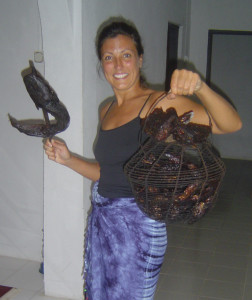 All the while, they smiled and genuinely praised God for the small blessings. I want to reflect those same smiles and attitudes every day in my own life.
All the while, they smiled and genuinely praised God for the small blessings. I want to reflect those same smiles and attitudes every day in my own life.
Food was basic and fresh, but its preparation sometimes involved a long process like a Thanksgiving meal.
Fish is first smoked to preserve it, because electrical power to refrigerators to keep food cool is irregular at best. The smoked fish is ground up and adds richness and protein to delicious stews.
Cassava root is used in many forms, and often is pounded and dried, turned into a flour and stored for long periods of time without refrigeration. Traditional garri, a staple starch, is a smooth, thick porridge made from cassava.
Yams, too, much like ours in the states, can be picked and stored for a long time on bowed racks. Often vegetables and goods are traded between families that grow different crops, or each item is sold at a stand.
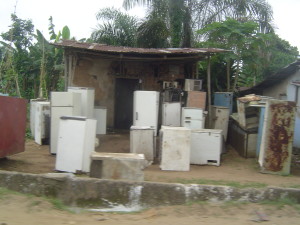
This Thanksgiving, I think about the everyday hard work and preparation of basic food in other countries like Nigeria, and the joyous attitudes that accompanied it. I can only be grateful for the bounty we have in the U.S. and the ease of which we obtain it. We can get any spice, any vegetable, any piece of meat and likely a tasty dessert, too, from a nearby grocery store with little effort. We can choose to spend a day or two cooking our Thanksgiving meals, or we can just as easily purchase one fully prepared with no effort but to pay for it. All reward; no laborious chore. No work, but the cleanup.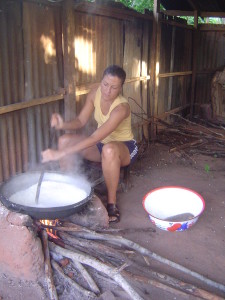
My last weekend in Nigeria arrived. Sad to leave, I grumbled a bit, “I have so little vacation time,” and “Ugh, I have to go to work on Monday.”
Mabel leaned into me. Her eyes sent little potent zaps of lightening. With her deep, English-Nigerian accent, she said slow, clear, and pointed like a soothsayer, “Sister, just remehmbah, almost every person in this country would literally giive theeir liife to go do your job on Monday.”
Snap! No Monday thereafter would be the same.
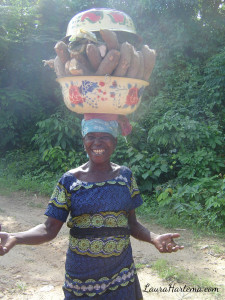 As I go to work on Mondays and every day in this land of abundance, I see those go without. A line stretches for a block in front of The Mission, a long wait for a hot meal. A row of men in bulky coats sleep on sheets of cardboard on a cold sidewalk. A man snugs up next to a light post on a narrow strip of raised concrete where rain won’t puddle beneath him. One man, with his shopping cart, shares his bread with the pigeons. How can we not notice or feel sorrow? How can we rise each day and be anything less than grateful for our own lives, for shelter, for even small amounts of food that we could share with others, even if just the birds?
As I go to work on Mondays and every day in this land of abundance, I see those go without. A line stretches for a block in front of The Mission, a long wait for a hot meal. A row of men in bulky coats sleep on sheets of cardboard on a cold sidewalk. A man snugs up next to a light post on a narrow strip of raised concrete where rain won’t puddle beneath him. One man, with his shopping cart, shares his bread with the pigeons. How can we not notice or feel sorrow? How can we rise each day and be anything less than grateful for our own lives, for shelter, for even small amounts of food that we could share with others, even if just the birds?
As we celebrate Thanksgiving this year, we have plenty for which to be thankful. Let’s not get hung up on family dramas, or that the turkey is dry, or that we have to go back to work after the holiday. We get to be with crazy family that mostly loves each other. We get to fill ourselves with imperfect food. We get to go back to work when so many people are unemployed, or their work is basic survival with another day of life as their sole reward.
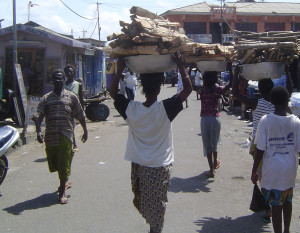
Each Monday I roll out from my luxury sheets, take a shower with fresh, warm water that I can drink from the faucet, walk to the bus, and press the sixth floor button in the elevator at my cushy office, I hear my Nigerian soul-sister’s words: they’d “giive theeir life to do your job.” I get to go to work. I get to eat.
This Thanksgiving, as you prepare a way and share food with others, give thanks and remember Native American Tecumseh’s words, “If you see no reason to give thanks, the fault lies only within yourself.”
Give thanks. Love this day.

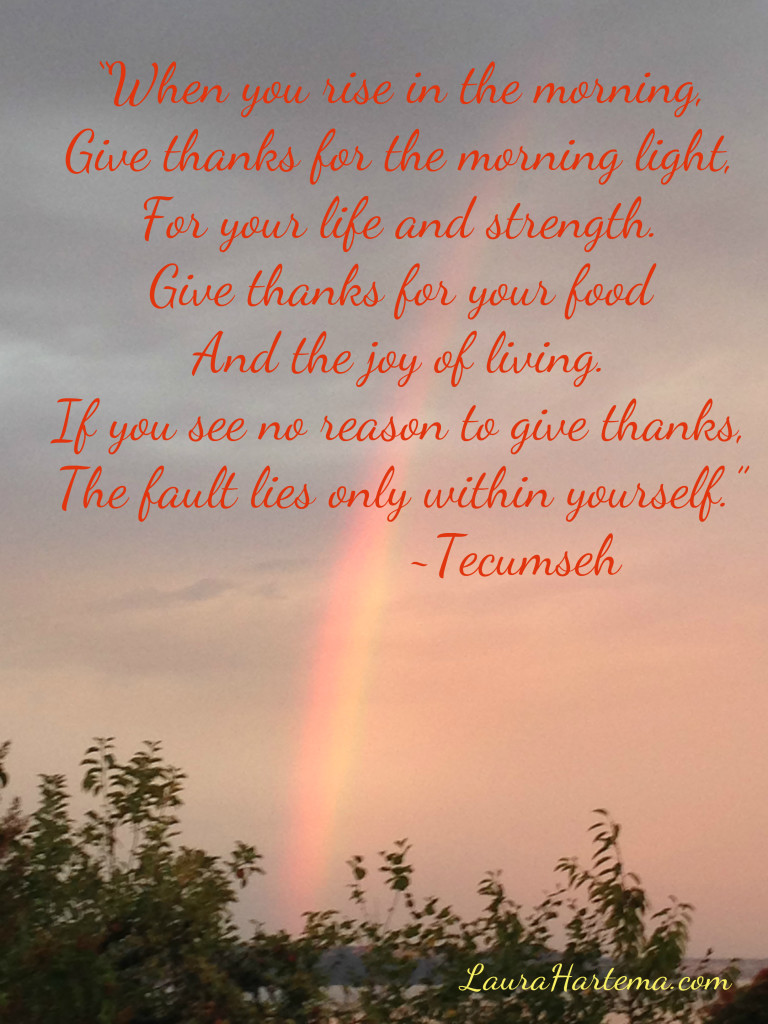
Beautifully stated my friend, so much we take for granted. Our middle-class American lives hold every privilege and riches far beyond our needs. Give thanks, and be generous in our ways!
Thank you for sharing this with us. We can all learn from your experience. Travel abroad, especially third world countries, opens our eyes to the lives and cultures of others. We live in America – the land of plenty and life is pretty easy except for the stress we mostly bring upon ourselves. Thanks for reminding us of this; I will be grateful for my privileged American life this year at Thanksgiving and my only complaint is that you won’t be joining us at our table! We will miss you, your laughter, and conversations, even your sneaky bananas! Always grateful for your friendship!
Laura, thanks for the tender reminder to appreciate each small gift in our daily lives.
Beautiful truth, Laura! Thank YOU for reminding all of US that joy in life is a matter of keeping proper perspective.